Homer’s face flashed delighted. “I, like you, ‘keep his covenant,’” he cried; and then without a lyre, for his was still in David’s hands, he sang, in clear tone:—
“Thou bid’st me birds obey;—I scorn their flight,
If on the left they rise, or on the right!
Heed them who may, the will of Jove I own,
Who mortals and immortals rules alone!"[E]
“That is more in David’s key,” said the young Philistine harper, seeing that the poets had fallen to talk together again. “But how would it sound in one of the hymns on one of our feast-days?”
“Who mortals and immortals rules alone.”
“How, indeed?” cried one of his young companions. “There would be more sense in what the priests say and sing, if each were not quarrelling for his own,—Dagon against Astarte, and Astarte against Dagon.”
The old captain bent over, that the poets might not hear him, and whispered: “There it is that the Hebrews have so much more heart than we in such things. Miserable fellows though they are, so many of them, yet, when I have gone through their whole land with the caravans, the chances have been that any serious-minded man spoke of no God but this ‘He’ of David’s.”
“What is his name?”
“They do not know themselves, I believe.”
“Well, as I said an hour ago, God’s man or Dagon’s man,—for those are good names enough for me,—I care little; but I should like to sing as that young fellow does.”
“My boy,” said the old man, “have not you heard him enough to see that it is not he that sings, near as much as this love of his for a Spirit he does not name? It is that spirited heart of his that sings.”
“You sing like him? Find his life, boy; and perhaps it may sing for you.”
“We should be more manly men, if he sang to us every night.”
“Or if the other did,” said an Ionian sailor.
“Yes,” said the chief. “And yet, I think, if your countryman sang every night to me, he would make me want the other. Whether David’s singing would send me to his, I do not feel sure. But how silly to compare them! As well compare the temple in Accho with the roar of a whirlwind—”
“Or the point of my lance with the flight of an eagle. The men are in two worlds.”
“O, no! that is saying too much. You said that one could paint pictures—”
“—Into which the other puts life. Yes, I did say so. We are fortunate that we have them together.”
“For this man sings of men quite as well as the other does; and to have the other sing of God—’
“—Why, it completes the song. Between them they bring the two worlds together.”
“He bows the heavens, and comes down,” said the boy of the olive-harp, trying to hum David’s air.
“Let us ask them—”
And just then there rang along the valley the sound of a distant conch-shell. The soldiers groaned, roused up, and each looked for his own side-arms and his own skin.




